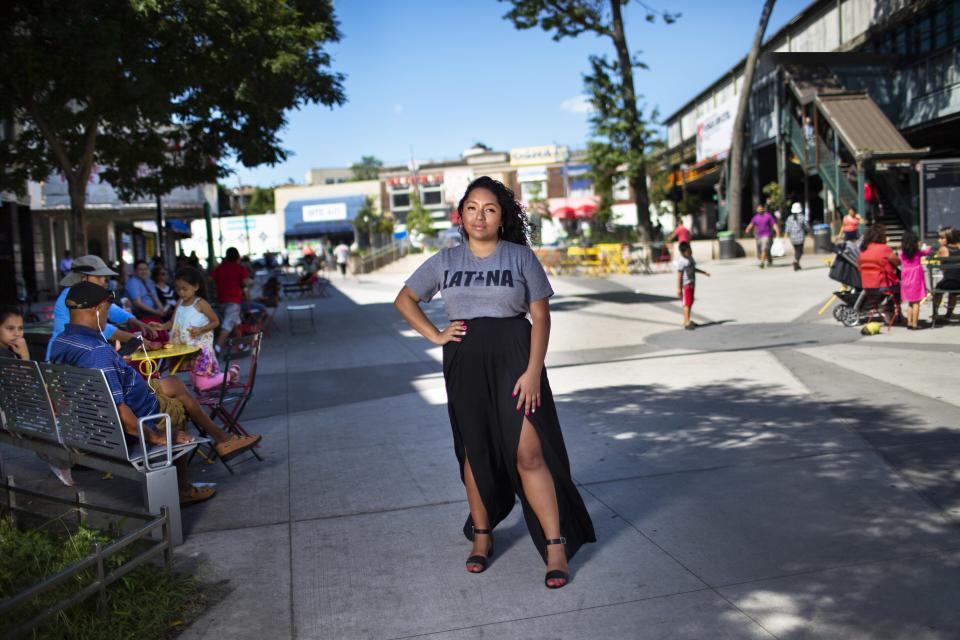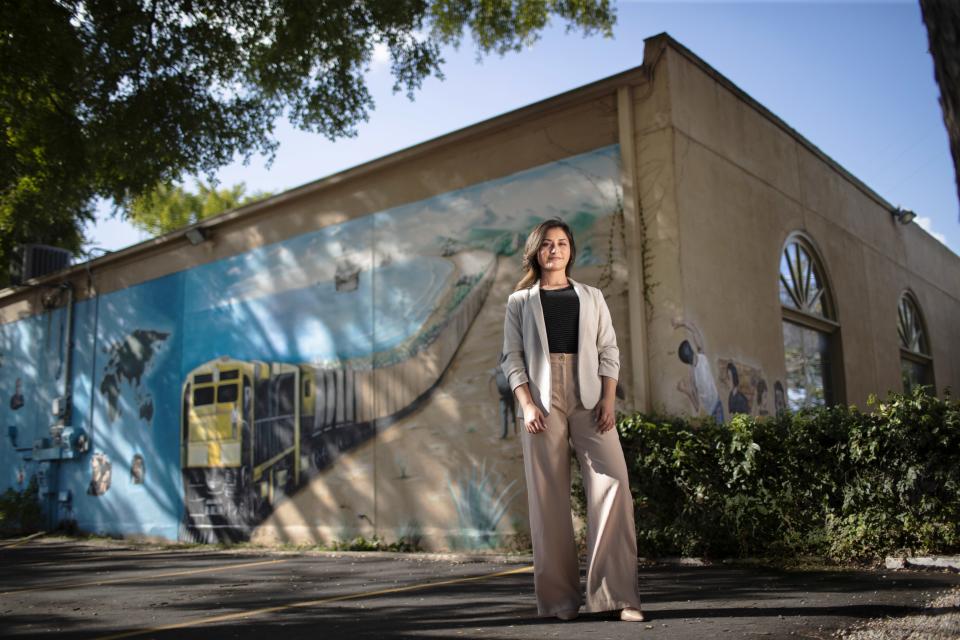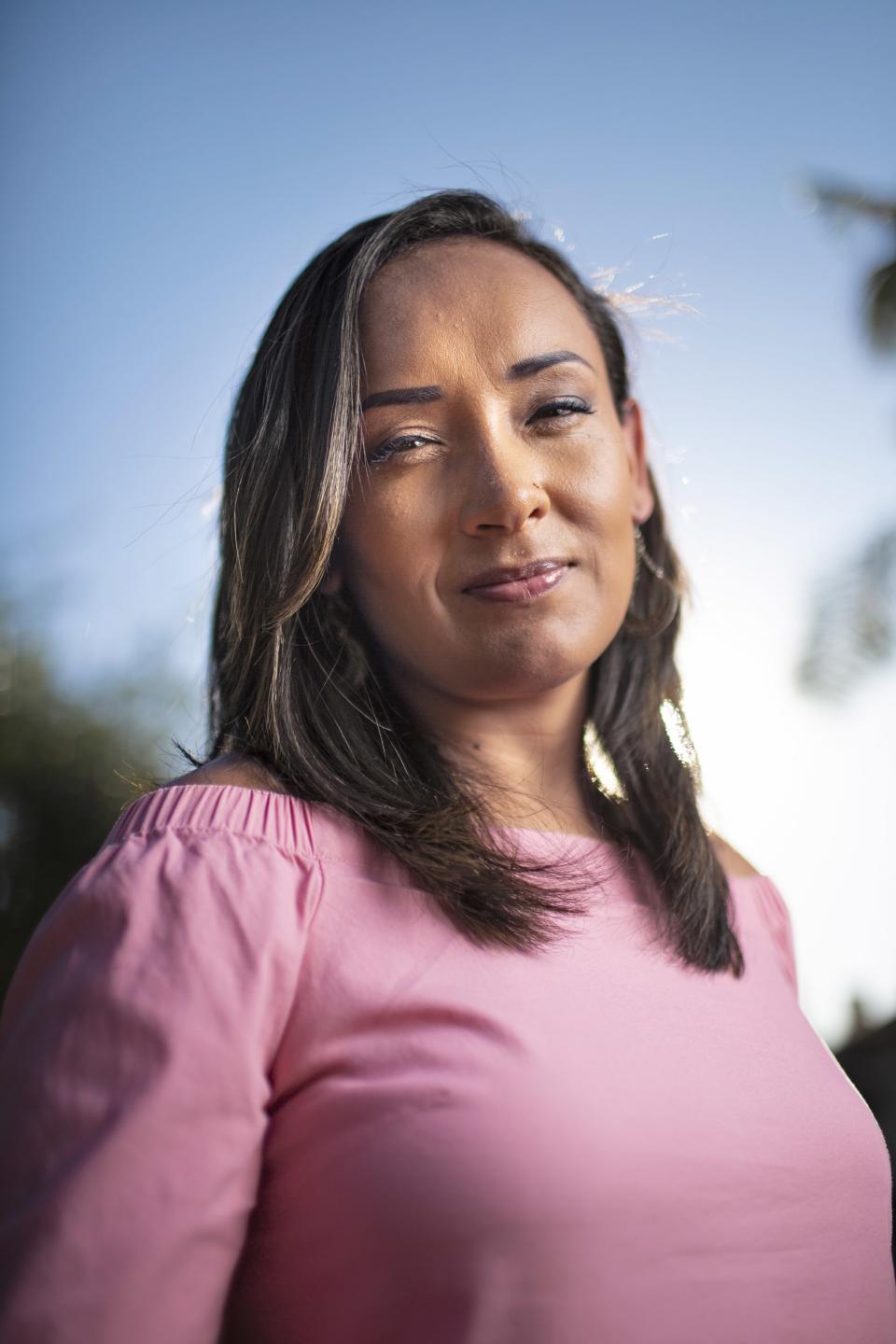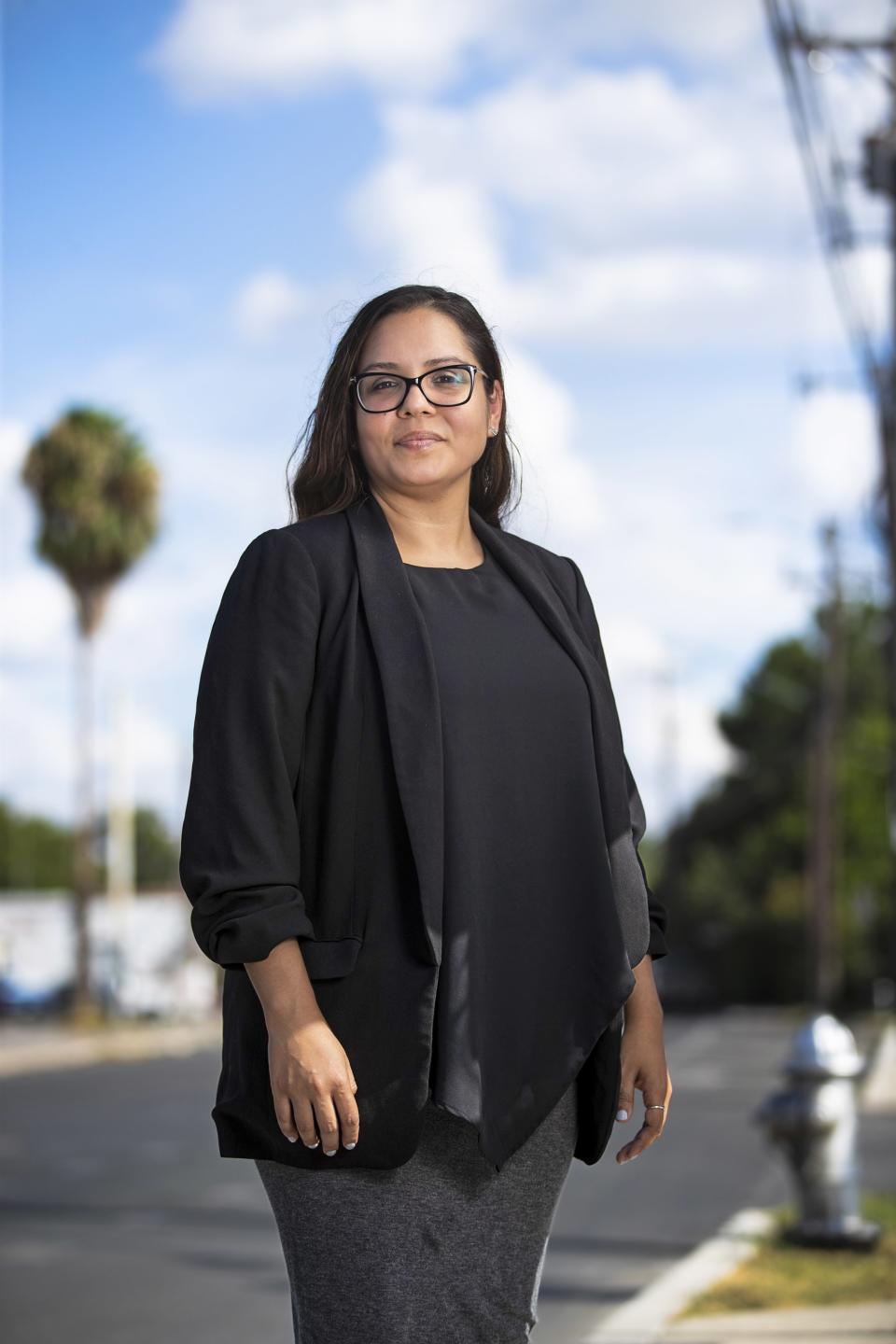The Women of RAICES Are Giving Immigrants a Voice
For her 27th birthday this past May, Lucia Allain traveled to the border. A citizen now, she’d grown up undocumented in New York City, a Peruvian immigrant whose mother worked so many hours and spoke so little English that it fell to Allain to attend parent-teacher conferences for her little brother. Birthdays weren’t really a thing. But this year, as part of the traveling she does for her job, she went to El Paso to collect the stories of asylum seekers who’d come to the United States for refuge. The people she met had been allowed in, for now—the fortunate few who would get to plead their cases. But with court dates far in the future, the migrants had been deposited at a bus station. These were stories not of the triumphant “good immigrant,” who’d started a small business or become a doctor or an engineer. Theirs were stories like her own, which so often go unheard.
Allain is the communications manager for RAICES, the Refugee and Immigrant Center for Education and Legal Services. Founded in San Antonio in 1986 as waves of refugees migrated north, farther from the civil wars savaging Central America, RAICES provides legal services to immigrants in federal detention. It now has 11 offices across the state of Texas. The organization serves a range of clients—unaccompanied children, single adults, and families—but its employees are majority female, and women hold most of the leadership positions. Many come from immigrant families themselves.
You know them. In April 2018, when the Trump administration instituted its “zero tolerance policy,” referring all adult migrants entering the country illegally for criminal prosecution, the Department of Homeland Security began separating them from their children and transferring children into the care of the Department of Health and Human Services. The nation erupted in collective outrage, and a new sense of urgency transcended borders both physical and political. When a Facebook fund-raiser was set up to help support RAICES bond out parents and reunite them with their children, the campaign took in more than $20 million in just over one week—that’s nearly three times the organization’s 2018 annual budget. It was the largest Facebook fund-raiser ever. Celebrities tweeted. Newspapers ran articles. Politicians took notice. Former San Antonio mayor and current presidential candidate Julián Castro, who’s made immigration central to his campaign, didn’t mince words. In an email he wrote, “At a time when immigrants and refugees are being vilified and attacked daily by the Trump administration, RAICES, and the women behind it, are ensuring the most vulnerable families are afforded their basic constitutional rights.”
It’s been a little more than a year since, and the administration’s assault on the nation’s immigrants continues apace, but so does the work of RAICES. On her birthday, then, collecting stories to help the world better understand that work, Allain wandered through the El Paso bus station, crammed with clusters of families forced into squalid conditions. There she met a young woman, tiny and vulnerable, holding a swaddled baby. Allain could see the journey in her face. The woman—let’s call her Luz—told Allain about the gang violence in Guatemala that she’d fled, and about how she had given birth five days before, on her own. With no one else to do it, she’d cut the umbilical cord herself. Now she needed diapers. She needed to wash. She was hungry but she had no food. Give me your tired, your poor... Allain gave Luz her lunch and held the swaddled baby so she could eat.
Allain and Luz realized they shared a birthday. She gave Luz a little pin she had with her. Love you, it said—kind of random. But Luz had left everyone she loved in Guatemala without saying goodbye. The pin made her weep. It would be her good-luck charm. Recently, Luz called Allain to tell her she had a job, that she was safe. She told her the pin reminds her that she is loved. Stories like that—of a woman who had the courage to journey, pregnant and alone, across treacherous landscapes in order to give her child a more hopeful life—“really kind of bring me back and remind me why I do the type of work I do,” says Allain. “Women, they’re the pillar of this world.” And when those women and their children are under threat, it’s so often other women, like those of RAICES, who work to defend them.

Andrea Meza, 29, an attorney and the director of family detention with RAICES, often wonders what would happen if the system were flipped and women like Luz—women who have experienced the worst, who have put their lives on the line for their families—could be the decision makers for once. She believes in the powerful wisdom of the oppressed, who understand that life is about human connection and sacrifice and solidarity and compassion. “When you flip things, and put people who have been forced to the bottom to the top, I think that’s when trickle-down can actually happen,” Meza says.
Meza’s team focuses most of its work on the Karnes County Residential Center, a detention facility an hour southeast of San Antonio. RAICES staff and volunteers meet with clients, largely immigrants who are going through expedited removal proceedings, which allow border agents to deport a person without a hearing. But if a client states a fear of violence or persecution at home or declares an intent to seek asylum, he or she will enter the system. And then the process can take months or years.
So RAICES works with detainees at Karnes who are waiting in limbo, helping them prepare for their interviews with asylum officers and their hearings before immigration judges. The RAICES team annotates the horrors their clients could face at home in unsafe countries with as much documentation as possible— rape, torture, murder. It’s grueling, exhausting work. It forces clients to relive the most traumatic moments of their lives. And when those same clients despair of ever leaving or of getting sent back, the RAICES team is careful not to offer false hope: 65% of applicants were denied asylum in 2018, according to Syracuse University’s Transactional Records Access Clearinghouse. Six years ago, that rate was 42%. Narrating the process now, Meza is frank. It can be “really, really disheartening” to help clients attempt to navigate a “bureaucratic, procedural mess.” Sometimes she would have to tell them, “I don’t know why this is happening. I don’t know.”
Under the Trump administration, the immigration process is pointedly cruel and chaotic—but it’s also strategic, explains Michelle Garza Pareja, 35, chief legal service officer at RAICES. It’s “designed to instill fear in immigrant communities.” And the work that RAICES does at no cost to its clients is meant to counteract that intimidation, “to dispel that fear, to arm vulnerable immigrant families with the facts, and to provide legal resources to those that have been targeted for their status, or lack thereof, in this country.”

And it makes a difference. One recent report found that a migrant’s chances of being granted asylum were five times greater with an attorney than without. And the fact is that, unlike American citizens accused of a crime, those migrating to this country aren’t entitled to legal representation. As the daughter of Mexican immigrants, Mayra Jimenez remembers, when she was a volunteer for RAICES in law school, what a shock it was to discover that. She couldn’t believe that even kids weren’t guaranteed a court-appointed attorney. She immediately switched her concentration to immigration. After graduation she took a job with RAICES.
For much of her time with the organization, Jimenez, now 31, ran the children’s program. That team provides Know Your Rights presentations and legal services to unaccompanied minors who were not with a parent or guardian at the time of their apprehension. But last summer Jimenez also worked with children who had been with a parent or guardian and then were separated from them. Unlike adults, who can be deported without a court hearing, unaccompanied minors must present their cases before a judge. So RAICES jumps right in, representing between 6,000 and 7,000 children each year. The calculation for Jimenez is simple: “We just believe that no child should ever have to go to court by themselves.”
But the United States government doesn’t agree.
Sometimes the stories that children tell Jimenez nearly break her. Their pain is unfathomable—gang violence, hunger and thirst, rape, kidnapping, trafficking. She tries not to dwell on the negative outcomes, focusing instead on the times when she is able to make a difference in a person’s life. She took on one client’s case when he was just 16. At 19, he was approved for a green card. When she handed it to him, he burst into tears. “I’m so thankful,” he told her. “I thought I was going to be deported.” She went over some additional documentation with him and then prepared to send him off. “He was just like, ‘Miss, how much do I owe you?’ ” Jimenez remembers. It’s free, she told him. No charge. He couldn’t believe it. She’d done so much for him; he had to pay her. So she said to him, “You can repay me by getting your high school diploma or your GED.” The next time she heard from him, he told her he was enrolled in community college.
Still, that client was the exception, not the rule. When she feels overwhelmed by how much she can’t do for the children she represents, Jimenez goes home to her own daughter and spoils her for their sake. “I want to love her so much that she never feels that way,” she says.


Given the degree of trauma their clients suffer, the work that RAICES attorneys like Jimenez and Meza do—crucial as it is to their clients—is just part of the organization’s mission. “We need to change the system, we need to change policies, we need to change laws,” says Erika Andiola, 32, chief advocacy officer at RAICES. Her aim is to put herself out of work and eliminate the need for RAICES at all.
Andiola’s team leads legislative outreach. It mobilizes people, holding protests and marches. But perhaps its most pressing goal is to win a cultural case that will never go before a judge: It wants to change the narrative around immigration nationwide. And when the media loses interest or politicians lose focus, RAICES finds new outlets. In March 2019 at the SXSW festival in Austin, which thousands of influential leaders in tech and business attend, RAICES created a replica hielera, or icebox, the grimly nicknamed holding pens Customs and Border Patrol uses to detain migrants who cross into the U.S. Speakers looped audio of a distraught young girl captured at the border—a RAICES client. This summer Andiola’s team worked with the ad agency Badger & Winters to build cages on the streets of Manhattan. Viewers encountered sculptures of small children wrapped in foil blankets and weeping. The purpose of these installations, as Andiola puts it, is “to provocatively show the pain people are actually going through.” She knows the temptation to pretend it’s not happening; she wants to make the problem impossible to ignore.
Sometimes Andiola tries to envision a better world, one with more compassion for human suffering. Andiola arrived in Arizona as a child with her mother, brother, and sister. If she had crossed over now, she wonders, would she have been separated from them? A decade ago she was an activist in the DREAM Act movement, which pushed for residency status for immigrants brought to the U.S. as children. The day she got her first job under the provisions of DACA (Deferred Action for Childhood Arrivals), ICE almost deported her mother and brother. It was Andi- ola’s work on their behalf that helped keep them here. So much of this battle is being led by the mothers, daughters, sisters. Women like Andiola and all those at RAICES. When Andiola thinks of that better world, she says, it’s her mother’s face that she sees.
To learn more about RAICES and support its work at the border, visit raicestexas.org.

Come back each day this week to read profiles of the 2019 Glamour Women of the Year honorees and get your tickets to the two-day event here.
Kimberly Meyer is the author of The Book of Wanderings. She lives in Houston.
Originally Appeared on Glamour

